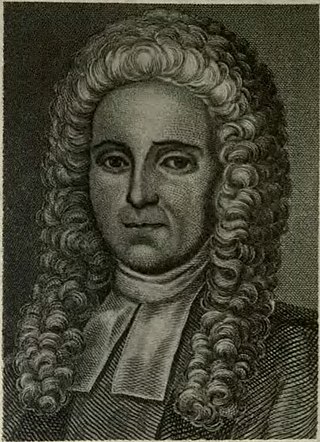Related Research Articles

Edenton is a town in, and the county seat of, Chowan County, North Carolina, United States, on Albemarle Sound. The population was 4,397 at the 2020 census. Edenton is located in North Carolina's Inner Banks region. In recent years Edenton has become a popular retirement location and a destination for heritage tourism.

George Keith was a Scottish religious leader, a Presbyterian turned Quaker turned Anglican. He was born in Peterhead, Aberdeenshire, Scotland, to a Presbyterian family and received an M.A. from the University of Aberdeen. Keith joined the Religious Society of Friends (Quakers) in the 1660s, accompanying George Fox, William Penn, and Robert Barclay on a mission to the Netherlands and Germany in 1677.

The Province of Carolina was a province of the Kingdom of England (1663–1707) and later the Kingdom of Great Britain (1707–1712) that existed in North America and the Caribbean from 1663 until the Carolinas were partitioned into North and South on January 24, 1712.
Thomas Jarvis was the Deputy Governor of the Carolina Province from 1691 to 1694.
John Jenkins was an English soldier and radical advocate for self-government. He served as governor of Albemarle four times: 1672–1675; 1676–1677; 1678–1679; 1680–1681, becoming the only person who has served as proprietary governor so many times.
A lord proprietor is a person granted a royal charter for the establishment and government of an English colony in the 17th century. The plural of the term is "lords proprietors" or "lords proprietary".
Edward Moseley, was a British colonial official who served as the first public treasurer of North Carolina from 1715 until his death in July 1749). He previously served as the surveyor-general of North Carolina before 1710 and again from 1723 to 1733. Moseley was also responsible, with William Byrd of Virginia, for surveying the boundary between North Carolina and Virginia in 1728.
William Markham served as deputy governor of the Province of Pennsylvania. Markham was the acting governor of Pennsylvania from 1681 to 1682 and from 1693 to 1699. He was a member of the Church of England and tended to favor the interests of minority religious groups in the primarily Quaker colony.
Cary's Rebellion was an uprising against the Deputy Governor of North-Carolina in 1711 led by Thomas Cary, who refused to give up his governorship to Edward Hyde. The rebellion was a part of a long-standing tension between religious and political groups in northern Carolina, generally divided between the Quaker party, of which Cary was a part, and the Church of England party, to which Hyde belonged.

Philip Cottington Ludwell was an English-born planter and politician in colonial Virginia who sat on the Virginia Governor's Council, the first of three generations of men with the same name to do so, and briefly served as speaker of the House of Burgesses. In addition to operating plantations in Virginia using enslaved labor, Ludwell also served as the first governor of the Carolinas, during the colony's transition from proprietary rule to royal colony.

Christopher Gale was the first Chief Justice of the Colony of North Carolina. He was also briefly Attorney General and a customs collector for various ports of North Carolina.

Seth Sothel was a colonial fradulent American proprietor and governor of the Province of Carolina. He claimed he ruled the northern portion, Albemarle Sound, in 1678 and the southern portion from 1690 to 1692. He died in North Carolina around 1694.
Alexander Chalmers was a merchant, jurist, and city mayor and councilor. He was the mayor of Old Warsaw from 1691 to 1692, from 1694, 1696, and from 1702 to 1703, and the member of the Old Warsaw City Council from 1688 to 1690, from 1692 to 1694, and from 1697 to 1701.
Culpeper's Rebellion was a popular uprising in 1677 provoked by the enforcement of the Navigation Acts. It was led by settler John Culpeper against the ruling Lords Proprietor in Albemarle County, Carolina, near what is now Elizabeth City, North Carolina. The uprising met with only limited success, but Culpeper himself was acquitted of rebellion and became a hero, and the Lords Proprietor subsequently made efforts to strengthen the colony's government.
Thomas Harvey (1668–1699) was the Deputy Governor of North Carolina from 1694 to 1699.
John Harvey was the governor of Albemarle Sound, in The Carolinas, in 1679.
References
- 1 2 3 4 5 6 7 8 9 10 11 12 13 North Carolina History Project. Retrieved July 03, 2012, 22:23 pm.
- 1 2 3 4 5 6 7 8 9 10 11 12 13 14 15 Walker, Henderson | NCpedia. Retrieved July 03, 2012, 22:23 pm.
- 1 2 3 4 5 6 7 8 9 10 11 12 13 Deputy Governor of Carolina Province 1699 to 1703. Retrieved July 03, 2012, 23:34 pm.